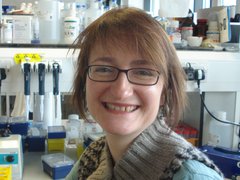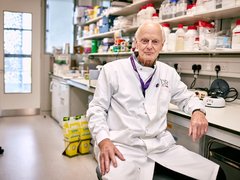Our research projects
Find out more about the research projects you're currently helping us to fund around the country.
107 results found.
Developing a new type of treatment for leukaemia
Chronic lymphocytic leukaemia responds to chemotherapy and other treatments, but these can stop working. Blood Cancer UK researchers look at how to overcome this.

Monitoring the progression of aggressive blood cancers and finding new ways to stop them
Dr Andrejs Braun is studying a protein that he thinks may help to predict how aggressive certain types of blood cancer will be. They want to understand how and why this protein can influence the outcome of blood cancer.
Attacking the roots of AML
In some cases of AML, people can see their disease return. This is because some cells get left behind despite treatment. Professor Bertie Göttgens wants to understand more about this and find new ways to treat the disease.
How does leukaemia develop in babies?
Some babies develop leukaemia’s as a result of changes that happen before birth. Professor Katrin Ottersbach wants to understand more about these changes and why some babies see their cancer return despite treatment.
Developing a risk score for graft-versus host disease in stem cell transplants
Graft versus host disease is a dangerous complication of stem or bone marrow transplant. Professor Paul Moss wants to understand more about the disease so we predict who might develop it.
Zeroing in on a pathway that drives myeloma
Myeloma is a blood cancer of the plasma cells, which is difficult to treat. Professor Ulf Klein is studying a signalling pathway thought to be involved in the disease in the hope of being able to identify new treatment targets.
Mapping gene changes in ALL
A change in a gene called BCR-ABL can initiate the development of acute lymphoblastic leukaemia. However, other changes happen which cause the disease to develop fully. Dr Feldahn wants to understand more about this process.
Developing a new type of treatment for leukaemia
Our researcher is developing a brand-new type of treatment which could provide a new option for people with leukaemia.

Developing more effective and safer treatments for childhood leukaemia
We need to continue to develop treatments for childhood acute lymphoblastic leukaemia (ALL). Prof Tariq Enver and his team are learning more about the biology of childhood ALL, and why it sometimes comes back after treatment. This work could ensure that everyone gets treatments tailored for them, to give them the best chance of a cure.
The Precision Medicine in Aggressive Lymphoma consortium
Standard treatments for diffuse large B-cell lymphoma (DLBCL) don’t work for everyone. Prof Johnson is leading a team of researchers from across UK to find better ways to categorise and diagnose DLBCL. This will help ensure everyone with DLBCL gets the right treatment for them.
Understand the biology of aggressive DLBCL
Our researchers are studying changes in the DNA of an aggressive type of DLBCL. This could lead to new treatments and a better chance of survival.
Studying how the immune system behaves in myeloma
Blood Cancer UK's researchers study how the immune system changes in myeloma and during treatment. Their work could help keep myeloma at bay for longer.

Repurposing drugs to treat acute myeloid leukaemia
Blood Cancer UK's researchers look at whether existing drugs for solid tumours can treat AML. This could provide a new option for people with the disease.
Improving the lives of children with leukaemia through tailored treatment
While we know that multiple genetic changes can cause Leukaemia, it's hard to identify them without comparing lots of leukaemia DNA samples. Professor Christine Harrison's project collects and analyses genetic information from children with leukaemia to try and understand how to treat the disease.
New treatments for Richter’s syndrome
Richter’s syndrome is a complication of chronic lymphocytic leukaemia. Blood Cancer UK researchers will add a drug to treatment to see if this improves outcome.
MAJIC trial
Professor Claire Harrison wants to trial a new drug in people who have MPN who are unable to receive standard chemotherapy.
MATCHPOINT trial
This trial will look at a new treatment combination for people with a more advanced phase of CML who have limited treatment options left.
UKALL 2011 Trial - Professor Pamela Kearns
Professor Pamela Kearns's UKALL 2011 trial that looks at treatment for children who have acute lymphoblastic leukaemia (ALL) or a type of non-Hodgkin lymphoma (NHL) called lymphoblastic lymphoma (LBL).
CALiBRe Trial
There are a number of different treatments doctors use to treat people with chronic lymphocytic leukaemia (CLL). These methods are effective but can have serious side effects and may not be suitable for some people. Researchers hope that a new drug can be used to treat these people.
CLARITY trial - Professor Peter Hillmen
Read more about the CLARITY trial, lead by Professor Peter Hillmen, which investigates whether combining ibrutinib and venetoclax creates a better treatment for people with CLL (Chronic lymphocytic leukaemia).
